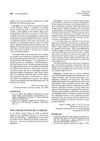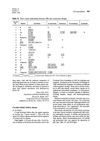27 citations,
February 1988 in “Journal of the American Academy of Dermatology” The skin condition Ulerythema ophryogenes did not improve with treatment in a patient with other birth defects.
 5 citations,
February 2013 in “Expert Review of Dermatology”
5 citations,
February 2013 in “Expert Review of Dermatology” New acne treatments include combination creams, advanced retinoids, and light therapies, focusing on safety and patient adherence.
 3 citations,
July 2011 in “Journal of the Egyptian Women's Dermatologic Society (Print)”
3 citations,
July 2011 in “Journal of the Egyptian Women's Dermatologic Society (Print)” Acne is common in adult women, often continues from adolescence, and can lead to scarring.
January 2015 in “프로그램북(구 초록집)” Epiduo® is an effective first-line acne treatment that reduces inflammation and combats antibiotic resistance.
 September 2023 in “International Journal of Community Medicine and Public Health”
September 2023 in “International Journal of Community Medicine and Public Health” Different sebaceous gland diseases can be treated with medications, hormone therapy, or surgical methods.
 15 citations,
January 2016 in “Dermatologic Clinics”
15 citations,
January 2016 in “Dermatologic Clinics” Start acne treatment early to prevent scarring, consider antibiotic resistance, use maintenance therapy, and manage side effects carefully.
 5 citations,
January 2024 in “Journal of the American Academy of Dermatology”
5 citations,
January 2024 in “Journal of the American Academy of Dermatology” Use benzoyl peroxide, retinoids, antibiotics, and isotretinoin for acne, and combine treatments for better results.
January 2023 in “Dermatologic Therapy” Intralesional corticosteroids and 5-alpha-reductase inhibitors are the best treatments for frontal fibrosing alopecia.
 11 citations,
April 2020 in “Journal of Dermatological Treatment”
11 citations,
April 2020 in “Journal of Dermatological Treatment” Taking oral isotretinoin with creams worked better for treating a type of hair loss than creams alone.
 May 2024 in “Journal of Education, Health and Sport”
May 2024 in “Journal of Education, Health and Sport” Current treatments for folliculitis decalvans include antibiotics, isotretinoin, and potential new therapies like botulinum toxin A and PRP.
 17 citations,
August 2018 in “Journal der Deutschen Dermatologischen Gesellschaft”
17 citations,
August 2018 in “Journal der Deutschen Dermatologischen Gesellschaft” Researchers found that dissecting folliculitis of the scalp is linked to obesity, severity increases with duration and number of nodules, and early treatment is important to prevent scarring.
 1 citations,
October 2022 in “Adolescent Health, Medicine and Therapeutics”
1 citations,
October 2022 in “Adolescent Health, Medicine and Therapeutics” Gender-affirming therapy can cause skin issues like acne and hair loss in transgender adolescents, and more research is needed on its dermatological effects.
37 citations,
February 2015 in “Journal of the European Academy of Dermatology and Venereology” Oral isotretinoin is the most effective treatment for folliculitis decalvans.
 17 citations,
August 2015 in “Expert Opinion on Pharmacotherapy”
17 citations,
August 2015 in “Expert Opinion on Pharmacotherapy” The document concludes that oral finasteride and topical minoxidil are effective for genetic hair loss, while other treatments for different types of hair loss show promise but need more research.
 January 2017 in “Clinical approaches and procedures in cosmetic dermatology”
January 2017 in “Clinical approaches and procedures in cosmetic dermatology” Men are increasingly seeking quick-result cosmetic treatments for their thicker, oilier skin and hair loss issues.
 January 2016 in “Springer eBooks”
January 2016 in “Springer eBooks” Hyperandrogenism, often causing excessive hair growth and acne, can be treated with methods like weight reduction, hair removal, various medications, and in the case of acne, topical treatments.
 August 2022 in “IntechOpen eBooks”
August 2022 in “IntechOpen eBooks” The best treatment for Frontal Fibrosing Alopecia and Lichen Planopilaris combines oral and topical medications to reduce symptoms and stop hair loss.
 January 2022 in “Clinical Cases in Dermatology”
January 2022 in “Clinical Cases in Dermatology” Some hair loss from medication may reverse after stopping the drug, but treatment options are limited and ongoing research is needed.
 13 citations,
March 2011 in “British Journal of Dermatology”
13 citations,
March 2011 in “British Journal of Dermatology” A woman with scalp lymphoma and hair loss improved with radiotherapy, highlighting the need for biopsies in similar cases.
 January 2012 in “Yearbook of Dermatology and Dermatologic Surgery”
January 2012 in “Yearbook of Dermatology and Dermatologic Surgery” Some African American women experience central scalp hair loss, often linked to a history of fungal scalp infection.
 14 citations,
November 1987 in “Journal of The American Academy of Dermatology”
14 citations,
November 1987 in “Journal of The American Academy of Dermatology” A woman developed a severe skin reaction called toxic epidermal necrolysis after taking the antibiotic cephalexin.
 18 citations,
March 1985 in “Journal of The American Academy of Dermatology”
18 citations,
March 1985 in “Journal of The American Academy of Dermatology” Cocaine use can cause a blistering skin disease.
 1 citations,
March 2024 in “International Journal of Dermatology”
1 citations,
March 2024 in “International Journal of Dermatology” CO2 laser-associated PDT effectively treated therapy-resistant folliculitis decalvans.
 96 citations,
September 2008 in “Seminars in Cutaneous Medicine and Surgery”
96 citations,
September 2008 in “Seminars in Cutaneous Medicine and Surgery” Hormonal treatments, including birth control and antiandrogens, can effectively treat acne in women.
 5 citations,
January 2014 in “Current Dermatology Reports”
5 citations,
January 2014 in “Current Dermatology Reports” Many adult women suffer from persistent or late-onset acne, and while various treatments exist, finding the right one can be challenging.
June 2012 in “Expert Review of Dermatology” No established treatment effectively stops inflammation and prevents hair loss in folliculitis decalvans.
 14 citations,
December 2007 in “Journal of The European Academy of Dermatology and Venereology”
14 citations,
December 2007 in “Journal of The European Academy of Dermatology and Venereology” The article concludes that dermatologists should prescribe lifestyle drugs carefully and consider mental health treatments for patients with disorders like BDD.
27 citations,
June 2017 in “Expert opinion on investigational drugs” New anti-acne medications are being tested to offer alternatives to current treatments.
 1 citations,
January 2015 in “Side effects of drugs annual”
1 citations,
January 2015 in “Side effects of drugs annual” The document concludes that various dermatological treatments and drugs can cause skin reactions and side effects.
 8 citations,
February 2010 in “Journal of Dermatology”
8 citations,
February 2010 in “Journal of Dermatology” A topical treatment safely and effectively reduced acne by causing targeted cell death in sebaceous glands without side effects.























